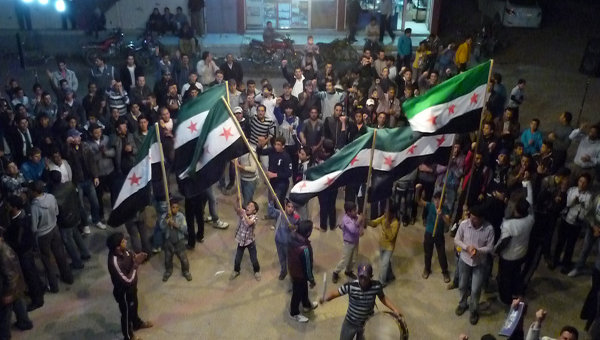
 US President Barack Obama’s decision to recognize a Syrian rebel coalition constitutes a political move and does not legally designate the group as Syria’s legitimate government, the US State Department said Wednesday.
US President Barack Obama’s decision to recognize a Syrian rebel coalition constitutes a political move and does not legally designate the group as Syria’s legitimate government, the US State Department said Wednesday."This is a political step, not a legal step,” State Department spokeswoman Victoria Nuland said Wednesday of Obama’s decision to recognize the Syrian Opposition Coalition, an alliance of rebel groups seeking to overthrow Syrian President Bashar al-Assad.
The clarification is not just diplomatic hairsplitting, former State Department and Obama administration officials say.
Conferring legal recognition involves numerous complicated territorial and property issues, including control of the Syrian government’s diplomatic presence in the United States, said Daniel Serwer, a former State Department mediator during the Bosnian war in the 1990s.
"They don’t want to have to deal with the problem of trying to give the embassy over to the coalition,” said
Obama told ABC News in an interview this week the United States had decided to recognize the Syrian Opposition Coalition because the group "is now inclusive enough, is reflective and representative enough of the Syrian population that we consider them the legitimate representative of the Syrian people in opposition to the Assad regime.”
At a news briefing Wednesday, Nuland said the move is meant to "give a boost to those working for a political transition in Syria” and "those planning a future that is democratic, that is pluralistic, that is unified.”
In the wake of the political recognition, the US government will also look to bolster its support for local leaders’ efforts to deliver essential services to areas controlled by the Syrian opposition, Nuland said.
But legal recognition of a state by Washington follows a particular set of criteria spelled out by a 1933 treaty to which it is a signatory, noted Catherine Powell, a former director for human rights in Obama’s National Security Council
These criteria include a permanent population, a defined territory that the group controls, a governing structure, and the capacity to carry on relations with other states, Powell told RIA Novosti on Wednesday.
"In Syria it’s not clear that the opposition meets all these criteria,” she said.
Known formally as the National Coalition of Syrian Revolutionary and Opposition Forces, the group had already been granted recognition by France, the United Kingdom and several other countries.
More than 100 nations, including the United States and Western European countries, declared their support for the opposition coalition Wednesday at a gathering in Marrakech, Morocco.
The expression of solidarity came amid reports by US media, citing senior American officials, that Assad forces had fired Scud missiles at rebel groups in northern Syria.
Nuland told Wednesday’s news briefing that missiles were being used against the Syrian rebels but declined to identify the type of missiles.
White House spokesman Jay Carney would not confirm the reports but said that if they are true, they represent "the last desperate act from a regime that has shown utter disregard for innocent life, utter disregard for the lives of its own citizens.”
Russia on Wednesday voiced opposition to the US move to recognize the Syrian Opposition Coalition. Moscow has maintained that militant Islamist factions could come to power in Syria should the Assad government fall, and Moscow has repeatedly resisted efforts by Western and Arab countries to undermine the Syrian president.
The United States has voiced concerns as well about militant elements within the Syrian opposition, most notably with its move to designate the al-Nusra Front, a faction in the Syrian opposition, a terrorist group.
The common concern between Russia and the United States could prove crucial going forward, Serwer, the former State Department official, told RIA Novosti.
"This is a growing area of agreement between Moscow and Washington,” said Serwer, a professor at Johns Hopkins University’s Paul H. Nitze School of Advanced International Studies in Washington. "That’s very promising, because that’s exactly what’s needed to end this.”
RIA Novosti


_jpg/250px-ElbeDay1945_(NARA_ww2-121).jpg)





